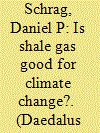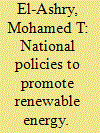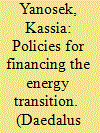|
|
|
Sort Order |
|
|
|
Items / Page
|
|
|
|
|
|
|
| Srl | Item |
| 1 |
ID:
113141


|
|
|
| 2 |
ID:
113145


|
|
|
|
|
| Publication |
2012.
|
| Summary/Abstract |
Public opinion about energy can be understood in a unified framework. First, people evaluate key attributes of energy sources, particularly a fuel's cost and environmental harms. Americans, for example, view coal as relatively inexpensive but harmful, natural gas as less harmful but more expensive, and wind as inexpensive and not harmful. Second, people place different weights on the economic and environmental attributes associated with energy production, which helps explain why some fuels are more popular than others. Americans' attitudes toward energy are driven more by beliefs about environmental harms than by perceived economic costs. In addition, attitudes about energy sources are largely unrelated to views about global warming. These findings suggest that a politically palatable way to reduce greenhouse gas emissions is through regulation of traditional pollutants associated with fossil fuels, rather than a wholly new carbon policy.
|
|
|
|
|
|
|
|
|
|
|
|
|
|
|
|
| 3 |
ID:
113143


|
|
|
|
|
| Publication |
2012.
|
| Summary/Abstract |
The United States was remarkably complacent about energy policy until the Arab oil embargo of 1973. Since then, we have relied on unnecessarily costly regulations and poorly designed subsidies to mandate or encourage particular forms of energy production and use. Our presidents have quested after an elusive technological "silver bullet." Congress has elevated parochial interests and short-term political advantages over national needs. Despite the thousands of pages of energy legislation enacted over the past four decades, Congress has never demanded that Americans pay a price that reflects the full costs of the energy they consume. Given our nation's economic fragility, our difficult fiscal situation, and the daunting challenges of achieving energy security and limiting climate change, we can no longer afford second- and third-best policies. This essay discusses the failures of the past and how we might avoid repeating them.
|
|
|
|
|
|
|
|
|
|
|
|
|
|
|
|
| 4 |
ID:
113146


|
|
|
|
|
| Publication |
2012.
|
| Summary/Abstract |
Shale gas is a new energy resource that has shifted the dominant paradigm on U.S. hydrocarbon resources. Some have argued that shale gas will play an important role in reducing greenhouse gas emissions by displacing coal used for electricity, serving as a moderate-carbon "bridge fuel." Others have questioned whether methane emissions from shale gas extraction lead to higher greenhouse gas emissions overall. I argue that the main impact of shale gas on climate change is neither the reduced emissions from fuel substitution nor the greenhouse gas footprint of natural gas itself, but rather the competition between abundant, low-cost gas and low-carbon technologies, including renewables and carbon capture and storage. This might be remedied if the gas industry joins forces with environmental groups, providing a counterbalance to the coal lobby, and ultimately eliminating the conventional use of coal in the United States.
|
|
|
|
|
|
|
|
|
|
|
|
|
|
|
|
| 5 |
ID:
113149


|
|
|
|
|
| Publication |
2012.
|
| Summary/Abstract |
The world is entering a new energy era marked by concerns over energy security, climate change, and access by the poor to modern energy services. Yet the current energy path is not compatible with sustainable development objectives. Global demand for energy will continue to grow; so will CO2 emissions. Achieving a low-carbon energy world will require an unprecedented technological transformation in the way energy is produced and used. That transformation has begun, as renewables capacity continues to grow, prices continue to fall, and shares of global energy from renewables continue to increase. Government policies are the main driver behind renewable energy's meteoric growth. Still, the world is tapping only a small amount of the vast supply of renewable energy resources. There is broad consensus that the role of these resources should be expanded significantly in order to meaningfully address energy security, energy access, and climate change.
|
|
|
|
|
|
|
|
|
|
|
|
|
|
|
|
| 6 |
ID:
113142


|
|
|
|
|
| Publication |
2012.
|
| Summary/Abstract |
Energy consumption is critical to economic growth and quality of life. America's energy system, however, is malfunctioning. The status quo is characterized by a tilted playing field, where energy choices are based on the visible costs that appear on utility bills and at gas pumps. This system masks the "external" costs arising from those energy choices, including shorter lives, higher health care expenses, a changing climate, and weakened national security. As a result, we pay unnecessarily high costs for energy. New "rules of the road" could level the energy playing field. Drawing from our work for The Hamilton Project, this paper offers four principles for reforming U.S. energy policies in order to increase Americans' well-being.
|
|
|
|
|
|
|
|
|
|
|
|
|
|
|
|
| 7 |
ID:
113148


|
|
|
|
|
| Publication |
2012.
|
| Summary/Abstract |
Historically, energy transitions have occurred gradually over the span of several decades, marked by incremental improvements in technologies. In recent years, public interest in accelerating the next energy transition has fueled a clean-energy policy agenda intended to underpin the development of a decarbonized energy economy. However, policies to date have encouraged investors to fund renewable energy projects utilizing proven technologies that are not competitive without the help of government subsidies. A true transition of the energy mix requires innovations that can compete with conventional energy over the long term. Investments in innovative technology projects are scarce because of the "commercialization gap," which affects projects that are too capital-intensive for venture capital yet too risky for private equity, project, or corporate debt financing. Accelerating innovation through the commercialization gap will require governments to allocate public dollars to, and encourage private investment in, these riskier projects. Policy-makers will face a trade-off between prioritizing policies for accelerating the energy transition and accounting for the risks associated with innovation funding in a tight budgetary environment.
|
|
|
|
|
|
|
|
|
|
|
|
|
|
|
|
| 8 |
ID:
113147


|
|
|
|
|
| Publication |
2012.
|
| Summary/Abstract |
The innovation system has interrelated components of invention, translation, adoption, and diffusion. Energy technology innovation has lagged that in other domains, and there is a compelling public interest in picking up the pace through appropriate government action. Government and universities are creating new approaches in the invention and translation stages. The Department of Energy (DOE) has implemented novel programs such as ARPA-E. Research universities have moved closer to the marketplace through more diversified industry collaboration models, such as convening research-sponsoring companies both horizontally in a sector and vertically across the innovation chain. Much more needs to be done to expand public-private partnerships and to define a broadly accepted government role in the adoption and diffusion stages. An administration-wide Quadrennial Energy Review process, informed by technical analysis and social science research, offers the best opportunity in this regard.
|
|
|
|
|
|
|
|
|
|
|
|
|
|
|
|
| 9 |
ID:
113144


|
|
|
|
|
| Publication |
2012.
|
| Summary/Abstract |
Emissions of greenhouse gases linked with global climate change are affected by diverse aspects of economic activity, including individual consumption, business investment, and government spending. An effective climate policy will have to modify the decision calculus for these activities in the direction of more efficient generation and use of energy, lower carbon-intensity of energy, and a more carbon-lean economy. The only technically feasible and cost-effective approach to achieving this goal on a meaningful scale is carbon pricing: that is, market-based climate policies that place a shadow-price on carbon dioxide emissions. We examine alternative designs of three such instruments: carbon taxes, cap and trade, and clean energy standards. We note that the U.S. political response to possible market-based approaches to climate policy has been, and will continue to be, largely a function of issues and structural factors that transcend the scope of environmental and climate policy.
|
|
|
|
|
|
|
|
|
|
|
|
|
|
|
|
|
|
|
|
|